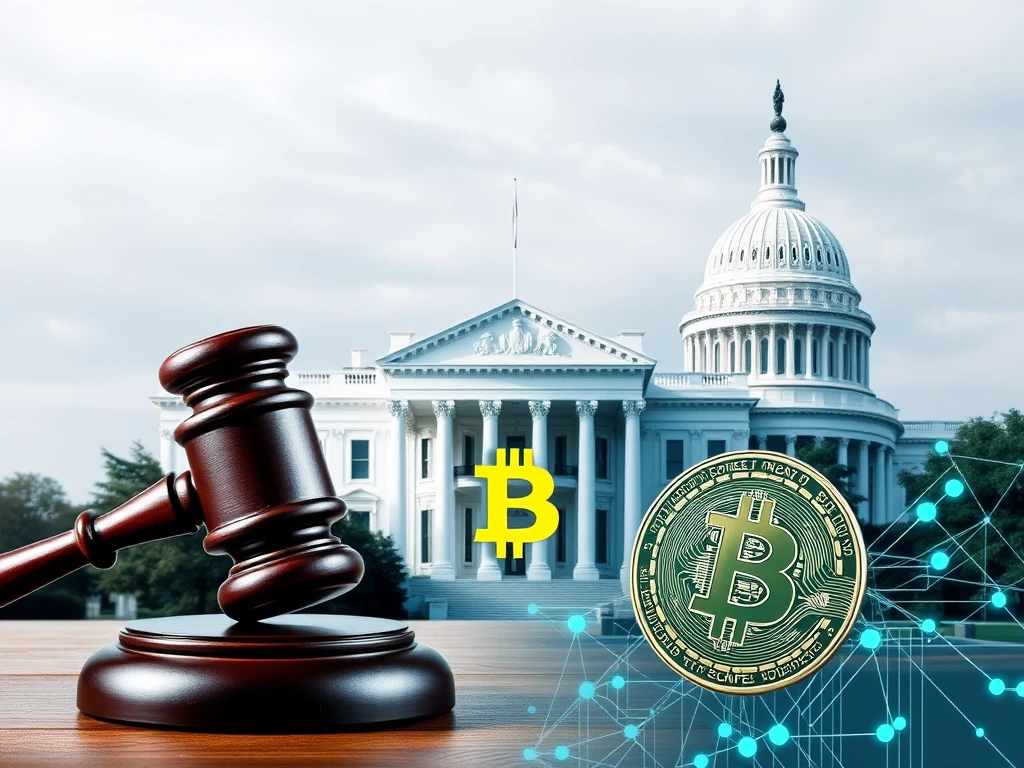Crucial Crypto News: DOJ Seeks Harsh Sentence in Alex Mashinsky Case

Welcome to your daily wrap-up of the most important developments in the world of digital assets. Staying informed about the latest crypto news is essential in this fast-paced market. Today brings significant updates on high-profile legal cases, industry advocacy efforts, and potential state-level crypto adoption.
DOJ Requests Stiff Penalty in Alex Mashinsky Sentencing
The legal consequences continue for figures from the 2022 crypto market downturn. The U.S. Department of Justice (DOJ) has formally requested a 20-year prison sentence for Alex Mashinsky, the co-founder and former CEO of the now-bankrupt crypto lending platform, Celsius. This request was detailed in a 97-page sentencing memorandum filed on April 28.
- The DOJ argues that Mashinsky’s actions constituted a “years-long campaign of lies and self-dealing.”
- These actions allegedly resulted in billions of dollars in losses for Celsius customers, who were unable to access approximately $4.7 billion in assets after withdrawals were halted in June 2022.
- Mashinsky’s December 2024 guilty plea included admissions that he led criminal activity at Celsius, causing over $550 million in losses and personally benefiting by more than $48 million.
- The DOJ emphasized that Mashinsky’s crimes were deliberate, not accidental, driven by a pursuit of personal wealth.
The requested Alex Mashinsky sentencing highlights the government’s intent to pursue severe penalties for fraud within the crypto space.
Advocacy Group Addresses White House on Crypto Regulation and Developer Prosecution
In other significant developments impacting crypto regulation, a group led by the DeFi Education Fund has sent a petition to White House crypto advisor David Sacks. The petition, dated April 28, calls for an end to what it describes as the “lawless prosecution” of open-source software developers.
A key focus of the petition is the case of Roman Storm, a developer associated with the crypto mixing service Tornado Cash. Storm was charged in August 2023 with assisting in laundering over $1 billion via Tornado Cash. The group argues that prosecuting developers for how others use their code is unprecedented and could stifle crypto development in the United States. The petition urges President Donald Trump to intervene and stop the current DOJ campaign against developers.
The petition has gathered over 250 signatures from industry executives and developers, indicating broad concern over this legal approach. Meanwhile, there are reports that prosecutors may be considering dismissing the case against executives of the Samourai Wallet mixer following recent changes in the DOJ’s crypto team leadership.
Arizona Takes Steps Towards State Bitcoin Reserve
On the legislative front, Arizona lawmakers are advancing bills that could allow the state to hold cryptocurrencies as a reserve asset. The Arizona House of Representatives recently passed two such bills.
- Senate Bill 1025 (SB1025), which proposes allowing a strategic Bitcoin reserve, passed the House with 31 votes in favor and 25 opposed.
- Senate Bill 1373 (SB1373), aimed at establishing a broader state-level digital assets reserve, also passed with 37 votes for and 19 against.
State Representative Jeff Weninger noted that SB1025 is similar to legislation being considered in other states, potentially allowing the state treasurer to invest up to 10% of funds into Bitcoin and other digital assets. He suggested that this could initially be permissive but would position the state for potential future shifts towards greater crypto adoption. The advancement of these bills marks a notable step towards a potential Bitcoin reserve Arizona could establish.
Summary
Today’s crypto news highlights the multifaceted nature of the industry’s interaction with legal and governmental bodies. From the severe sentence sought in the Alex Mashinsky sentencing to industry efforts challenging current approaches to crypto regulation and the prosecution of developers like those involved with Tornado Cash, the regulatory landscape remains a critical area of focus. Simultaneously, legislative progress like the potential Bitcoin reserve Arizona is considering demonstrates growing interest in integrating digital assets into traditional financial systems at the state level. These events underscore the ongoing evolution and challenges within the cryptocurrency ecosystem.








